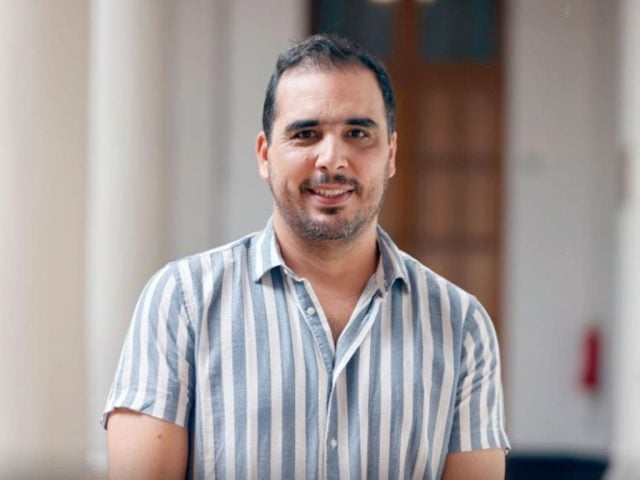Shots ring out in the Lins favela complex, in the north of Rio de Janeiro, Brazil, but in the distance. The children keep playing. The shots are part of the daily life of the community, as well as the fact that neighbors, almost always black, are killed by stray bullets, in police interventions against drug traffickers. Thus died Kathlen Romeu.
«They have forced us to normalize it so as not to go crazy. We have no way to change reality. We even know how to differentiate the types of shots, if they are from a pistol, from a rifle”, said Naimaa, a 26-year-old community volunteer and artist, to the journalist Marta Miera from RT.
On Wednesday night she participated in the demonstration for the death of Kathlen Romeu, 24 years old and four months pregnant. She did not know her, but she felt her death very near. «It could have been me, gosh». Like Naíma, Kathlen was young, black, and from the favela.
Violence prompted Kathlen to leave Lins in April. She had managed to graduate in design in September and was interspersing her job in a luxury clothing store with her dream of being a model.
Since she missed her grandmother, on Tuesday she went to visit her in the favela. Together they went out to the street to bring her aunt food to her work. A bullet hit her in the chest. She arrived lifeless at the hospital.
Her Instagram – with more than 51,000 followers – is full of photos of her and in her latest publication she appears smiling showing her pregnancy.
Her death has shocked the residents of the favelas and fueled the debate about police violence in these communities. The networks have been filled with images of the young woman with the ‘hastag’ #VidasNegrasImportam.
The commotion is in all the favelas of Brazil
According to Fogo Cruzado, an application that provides real-time shooting zone alerts in Rio de Janeiro, since 2017, 681 women were shot in the metropolitan region and 15 were pregnant. Four of the eight deaths occurred in police operations.
The Military Police reported that the shooting began because they had been attacked by criminals. The young woman’s mother accused the officers of being responsible: “The police fired indiscriminately. They executed my daughter, it was a bullet aimed at my daughter’s body».
Pablo Nunes, a security expert, explains to RT that it is not known if the bullet came from the Police. «That does not matter», because «the police are considered the main actor, the one that directs this type of violent combat».
According to the Network of Security Observatories, in 2019 in Rio de Janeiro there were 1,814 deaths in police interventions, and 1,423 people, 86%, were black. The Brazilian Public Security Forum (FBSP) estimates that of the 39,584 killed by homicide in 2019 in all of Brazil, 74.4% were black. Of that figure, 6,357 deaths, 13.3%, occured in police interventions.
“There is an increase in insecurity among the black population. Kathlen’s death is yet another example of the failure of public safety. They (the police) put their ‘effort’ in violent operations in the favelas and the result is that the violence is not reduced, while the tragedies accumulate and the criminal groups are strengthened”, emphasizes Nunes.
The specialist also highlights that State violence is focused only on small drug traffickers and not on the large and powerful. Added to all this are the armed militias, vigilante groups made up of active or retired police, military or firefighters, who control some of the favelas and condition the lives of millions of people.
Naíma does not deny that many times the shots are by drug traffickers, but emphasizes that in the favelas there are rules imposed and among them is the respect for the neighbors.
After years of suffering endemic violence, she does not hesitate to speak. «The police arrive saying that they are going to make arrests, but come in to kill. They are supposed to defend the population and what they do is kill us. Us, blacks, who live in favelas and poor”, she laments.
Police ‘operations’ that do not stop
In 2020, as the residents of the favelas faced the pandemic, police operations did not stop. Between June 2020 and February 2021, the Police killed 685 people in this state. 85% of the deaths occurred in the metropolitan area of Rio de Janeiro.
The Supreme Court decided in June of that year to prohibit operations in the favelas during the pandemic, limiting them only to exceptional cases. Despite a decline in the first months, the trend changed in October when the new governor of Rio de Janeiro, Cláudio Castro, an ally of far-right president Jair Bolsonaro, took office.
Not only was the court’s decision not respected, but in May 2021 the bloodiest operation in the history of Rio de Janeiro was carried out in the Jacarezinho favela, leaving 28 dead.
«What happened in the Jacarezinho favela is no exception. It is a consequence of the lack of internal and external controls and the responsibility of the police authorities, whose actions are incompatible with democratic society”, says Geni, a research group at the Fluminense Federal University, in a joint study with Fogo Cruzado.
In this investigation, they warn that the so-called ‘chacinas’, homicides of three or more civilians in the same situation, are routine in the metropolitan region. In just five years, an average of one ‘chacina’ per week was registered in Rio and three out of four were the result of police actions or operations.
Kathlen had plans. She was planning to marry Marcelo Ramos, a tattoo artist and graphic designer, and buy an apartment so as to have her own family in Brazil.
“People are very sad, but we have to live with it. As a black person, if you don’t normalize that a black person dies every 23 minutes in this country, you won’t survive. You live in fear that any day it could be you or someone close to you. It’s every day”, says Naíma.











